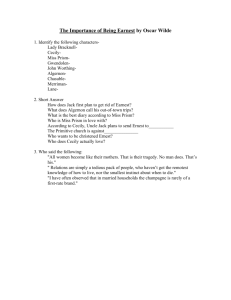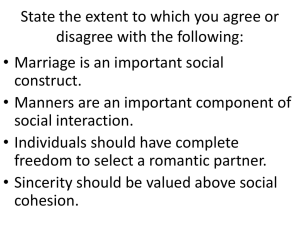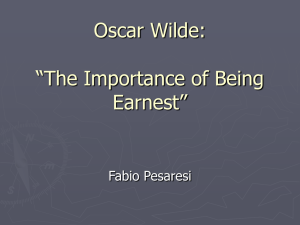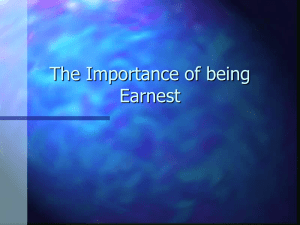The Importance of Being Earnest Introduction
advertisement
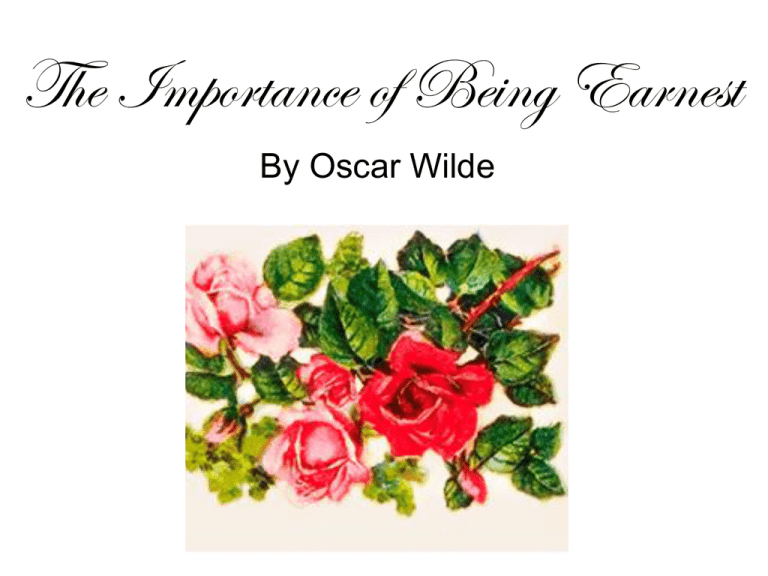
The Importance of Being Earnest By Oscar Wilde Characters John 'Jack' (Ernest) Worthing: The play’s protagonist. Jack Worthing is a seemingly responsible and respectable young man who leads a double life. In Hertfordshire, where he has a country estate, Jack is known as Jack; he has invented a fictitious brother “Ernest” who lives in London and whom he visits frequently. In London Jack is known as Ernest. As a baby, Jack was discovered in a handbag in the cloakroom of Victoria Station by an old man who adopted him and subsequently made Jack guardian to his granddaughter, Cecily Cardew. Jack is in love with his friend Algernon’s cousin, Gwendolen Fairfax. Characters Cecily Cardew: Jack’s ward, the granddaughter of the old gentlemen who found and adopted Jack when Jack was a baby. Like Gwendolen, she is obsessed with the name Ernest, but she is even more intrigued by the idea of wickedness. This idea, rather than the virtuous-sounding name, has prompted her to fall in love with Jack’s “brother” Ernest in her imagination and to invent an elaborate romance and courtship between them. Characters Algernon “Algy” Moncrieff: Algernon is a charming, idle, decorative bachelor, nephew of Lady Bracknell, cousin of Gwendolen Fairfax, and best friend of Jack Worthing, whom he has known for years as Ernest. Algernon is brilliant, witty, selfish, amoral, and given to making delightful paradoxical and to the point pronouncements. He has invented a fictional friend, “Bunbury,” an invalid whose frequent sudden relapses allow Algernon to wriggle out of unpleasant or dull social obligations. Characters Gwendolyn Fairfax: Algernon’s cousin and Lady Bracknell’s daughter. Gwendolen is in love with Jack, whom she knows as Ernest. A model and arbiter of high fashion and society, Gwendolen speaks with unassailable authority on matters of taste and morality. She is sophisticated, intellectual, cosmopolitan, and utterly pretentious. Gwendolen is fixated on the name Ernest and says she will not marry a man without that name. Characters Lady Augusta Bracknell: Algernon’s snobbish, mercenary, and domineering aunt and Gwendolen’s mother. Lady Bracknell married well, and her primary goal in life is to see her daughter do the same. She has a list of “eligible young men” and a prepared interview she gives to potential suitors. Like her nephew, Lady Bracknell is given to making hilarious pronouncements, but where Algernon means to be witty, the humor in Lady Bracknell’s speeches is unintentional. She is cunning, narrow-minded, and authoritarian. Characters Dr. Frederick Chasuble: The rector on Jack’s estate. Both Jack and Algernon approach Dr. Chasuble to request that they be christened “Ernest.” Dr. Chasuble entertains secret romantic feelings for Miss Prism. Characters Miss Laetitia Prism: Cecily’s governess. Miss Prism is an endless source of clichés. She highly approves of Jack’s presumed respectability and harshly criticizes his “unfortunate” brother. Puritan though she is, Miss Prism’s severe pronouncements have a way of going so far over the top that they inspire laughter. Despite her rigidity, Miss Prism seems to have a softer side. She speaks of having once written a novel whose manuscript was “lost” or “abandoned.” Also, she entertains romantic feelings for Dr. Chasuble. Jack (lives in country); he wants to marry Gwendolyn but wants to “change” his name from Ernest to Jack Algernon (lives in London, the city); he will go to the country and woo Cecily as “Ernest” Cecily lives with Jack; he is her guardian; she is 18; she “loves” Jack’s wicked younger brother, Ernest Gwendolyn lives in the city; she is the cousin of Algernon; she loves Ernest when he comes to the city Bunbury is a “sick friend” Algernon has invented when he wants to excuse himself from engagements; he is always sick! Ernest is the “wicked younger brother” of Jack who lives in the city; Jack goes to see this brother to bail him out of trouble; really Jack “becomes” Ernest when in the city Earnest: Marked by or showing deep sincerity or seriousness; Of an important or weighty nature; grave; with a purposeful or sincere intent; serious; determined. What is the double meaning behind the title The Importance of Being Earnest? Why is it important to be earnest and Ernest by the end of the play?
